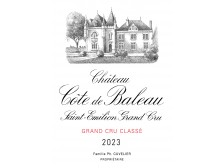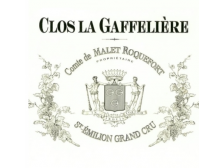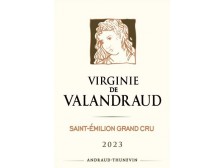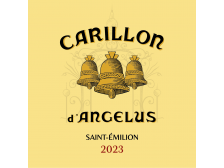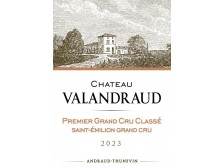2024 Futures
To find out about the week's releases, go to our Latest News page.
-
A doll-like vineyard comprising 4 pure Merlot parcels, located between Lafleur-Pétrus, Le Pin and Trotanoy. Henri Parent, owner and son of the late Mme Péré-Vergé, is committed to producing at La Violette the most melting, radiant and exuberant version of Pomerol. All this under the guidance of oenologist Michel Roland, who has made La Violette a showcase for his expertise: the search for the most accomplished maturity, manual de-stemming grain by grain, complete vinification in barrel, etc. The critics have succumbed to the charm of La Violette.
Critics succumb to La Violette's charm: “A great wine of emotion that touches the heart as much as the mind” for M. Bettane, “More than ever, La Violette offers a unique experience in Pomerol” for La Revue du Vin de France.
La Violette is undoubtedly the most sensual and extrovert Pomerol, but also one of the rarest (800 cases per year).More- To keep or to drink:
- Available early 2026
-
Like Pétrus, Le Pin is 100% Merlot. But if Pétrus has adopted a more classic style in recent years, Le Pin remains a hedonistic wine, often exuberant, sometimes even exotic. And unlike Pétrus, Le Pin is much rarer (500 cases per year).
More- To keep or to drink:
- Available early 2026
- Potential alcohol:
- 14%
- Blend:
- 100% Merlot
-
A small vineyard of 8 ha of old vines (70% Merlot), owned by Clos Fourtet. Superb wine, balanced and fruity and tasty, for a very modest price, which rightly became a grand cru classé in 2012. Totally agree with La Revue du Vin de France "The best quality/price ratio in Saint-Émilion".
More- To keep or to drink:
- Available early 2026
- Potential alcohol:
- 14%
- Blend:
- 95% Merlot, 5% Cabernet Franc
-
Created in 1985, Clos La Gaffelière is now independent, with its own winery and vat room. Made from the estate's clayey foothills, the blend is predominantly of Merlot and entirely aged without new wood, giving it a pure, delicate fruitiness (cherry, redcurrant).
More- To keep or to drink:
- Available early 2026
- Potential alcohol:
- 14.10%
- Blend:
- 85% Merlot, 15% Cabernet franc
-
Historically owned by the Malet de Roquefort family (Ch. La Gaffelière) since 1819, but sold in 1959 as part of an estate, Château Puyblanquet was returned to its original owner in 2021. This 19-hectare single vineyard, situated on a clay-limestone ridge to the east of the appellation, now benefits from the same care as its big brother. It's no surprise, then, to find in its wines the charm and finesse of texture that have made Ch. La Gaffelière such a success. According to the Guide Bettane & Desseauve 2025, this is “the greatest revelation in Saint-Émilion in recent years”.
More- To keep or to drink:
- Available early 2026
- Potential alcohol:
- 14.25%
- Blend:
- 80% Merlot, 20% Cabernet franc
-
Fombrauge, the largest vineyard in Saint-Émilion with 57 hectares, has been offering since its purchase by Mr. Magrez (1997) structured wines that do not deny their terroir, full, gourmet and devilishly seductive thanks to a luxurious maturing process.
More- To keep or to drink:
- Available early 2026
- Blend:
- 90% Merlot, 10% Cabernet franc
-
More infused than extracted, finely oaked, with a beautiful balance between fresh fruit and velvety tannins, this sapid and sensual Dragon is more than a second wine.
More- To keep or to drink:
- Available early 2026
- Potential alcohol:
- 14.1%
- Blend:
- 72% Merlot, 28% Cabernet franc
-
The terraces of Moulin Saint-Georges (7 ha) face those of Ausone (same owner). Thanks to the quality of its terroir and the refined style of its wines, Moulin Saint-Georges is a sure bet in the appellation. As the Revue du Vin de France's 2024 guide points out, "quality has been impressively consistent for over two decades, and prices remain reasonable. The only regret is the quantities available...".
Like all Vauthier vineyards (Ausone, La Clotte, Haut-Simard...), Moulin Saint-Georges began its conversion to organic farming in 2020.More- To keep or to drink:
- Available early 2026
- Blend:
- 85% Merlot, 15% Cabernet franc
- Organic certification:
- 2023
-
Small vineyard of 8.8 ha north-east of Saint-Émilion, property Garcin (Clos l'Église, Barde-Haut) since 2013. Their aim is not to produce yet another "competition animal" but a generously fruity, delicious, creamy, easily and quickly accessible Saint-Émilion.
More- To keep or to drink:
- Available early 2026
-
As well maintained as Canon-La Gaffelière (same owner), under the direction of Mr. Derenoncourt, Clos de l'Oratoire offers practically the same fullness and intensity for half the price.
More- To keep or to drink:
- Available early 2026
- Organic certification:
- 2020
-
With today 11 ha, the vineyard of Valandraud allows Mr. Thunevin to tighten his selections for the great wine and his second, Virginie de Valandraud (there is a 3rd, Clos Badon, and even a 4th wine!). Rich in colour, always delicious with an elegant tannic structure, Virginie de Valandraud makes those who think that second wines have no soul lie.
More- To keep or to drink:
- Available early 2026
- Potential alcohol:
- 14%
- Blend:
- 90% Merlot, 5% Cabernet franc, 5% Cabernet sauvignon
-
This 17-hectare vineyard, located in the extension of Troplong-Mondot, forms a magnificent south-facing amphitheater. Under the guidance of Hélène Garcin (Poésia, Clos l'Église) and her husband Patrice Lévêque, Barde-Haut offers vintage after vintage intense, rich and opulent wines, without ever falling into the trap of over-ripeness.
More- To keep or to drink:
- Available early 2026
-
An oenologist by training, Ms. Papon-Nouvel owns two tiny properties at the bottom of Saint-Émilion near Canon-La Gaffelière: Petit Gravet Aîné (2.4 ha) and Clos Saint-Julien (1.3 ha), where the vines are mainly old cabernets francs. From the vine to the cellar, she manages all the stages in the production of her wines on her own and, whatever the vintage, her talent as an instinctive winemaker gives wines of natural elegance and exemplary sweetness.
More- To keep or to drink:
- Available early 2026
- Organic certification:
- 2011
-
The amateur looking for fine and easily digestible classified great wines should be interested in Fonroque. In organic cultivation since 2006 and biodynamic cultivation since 2008, Fonroque offers an original vision of the terroir of the Saint-Émilion plateau, made up of freshness, elegance and controlled, melting power. A “wine of emotion”, as Michel Bettane and Thierry Desseauve describe it.
Alain Moueix, its director (and former owner), is clearly showing the way forward for the future of Bordeaux's great wines, on all shores.More- To keep or to drink:
- Available early 2026
- Blend:
- 87 % Merlot, 13 % Cabernet franc
- Organic certification:
- 2006
-
From 2005, La Dominique, prestigious terroir adjacent to Cheval Blanc, L'Évangile and La Conseillante, returns in great shape. His velvety and sensual style places him halfway between Saint-Émilion and Pomerol : “the tannin texture is very Pomerol-like, then the silky, floral, firm follow-through continues with the class of the great Saint-Emilions” (Bettane & Desseauve).
More- To keep or to drink:
- Available early 2026
- Potential alcohol:
- 15%
-
Mrs Papon-Nouvel's other grand cru (with Petit Gravet Aîné). Same organic culture, same sensitivity, same style, with extra flesh and depth. Great wine! Great wine, logically promoted to grand cru classé in 2022.
More- To keep or to drink:
- Available early 2026
- Organic certification:
- 2011
-
Dazzling success since 2015 of this great terroir just below Ausone: aromatic precision, superlative but harmonious depth, a big congratulations to Mr. Mallet (owner) and Mr. Derenoncourt (consultant). Since 2010, La Gaffelière is undoubtedly flying from success to success!
"We are here at the heart of what is most sensual and singular in Saint-Emilion", according to the Revue du Vin de France.More- To keep or to drink:
- Available early 2026
- Potential alcohol:
- 14.4%
- Blend:
- 58% Merlot, 42% Cabernet Franc
-
An ultra-refined great wine, with a mineral tension that is out of the ordinary in Bordeaux, the fruit of the great terroir of the Côte Pavie, but also of the complicity of Mr Nicolas Thienpont and Mr Stéphane Derenoncourt since 1994.
More- To keep or to drink:
- Available early 2026
- Blend:
- 82% Merlot, 17% Cabernet Franc, 1% Cabernet Sauvignon
- More
- To keep or to drink:
- Available early 2026
- Blend:
- 35 % Merlot, 45 % Cabernet franc, 20 % Cabernet sauvignon
- Organic certification:
- 2014
-
Immediate neighbour of Pavia, Larcis-Ducasse was logically promoted to 1st Grand Cru Classé in 2012 due to its full south-facing hillside exposure and the brilliant work of the Thienpont-Derenoncourt tandem.
More- To keep or to drink:
- Available early 2026
- Potential alcohol:
- 14.5%
- Blend:
- 86% Merlot, 14% Cabernet Franc
- More
- To keep or to drink:
- Available early 2026
- Organic certification:
- 2023
-
Rocheyron is the result of a friendly and professional partnership between Sylvio Denz (Faugères and Lafaurie-Peyraguey) and Peter Sisseck (Pingus). Since 2010, they have been investing in this small 8-hectare vineyard, located entirely on the asteriated limestone plateau characteristic of Saint-Émilion: tilling the soil, conversion to organic farming (certified in 2020), gentle vinification at low temperatures... Rocheyron is constantly progressing, and each year offers wines with an unequalled tannic softness.
More- To keep or to drink:
- Available early 2026
- Blend:
- 75% Merlot, 25% Cabernet franc
- Organic certification:
- 2020
-
Second wine of Angelus, made in the same luxurious and distinguished style that has made the reputation and international success of this wine.
More- To keep or to drink:
- Available early 2026
- Blend:
- 90% Merlot, 5% Cabernet franc, 5% Cabernet sauvignon
-
In 2012, Haut-Brion bought and combined two grands crus classés (Tertre-Dauguay and L'Arrosée) on the slopes of Saint-Émilion (Côte Ausone), and put a foot in the right bank, called Quintus because it is their fifth property (after Haut-Brion, La Mission HB, Laville HB and Latour HB).
Their first objective is to make fine, long wines, focusing on freshness and delicacy rather than power or density, more typical of the left bank than the right bank.
Second objective: to shine in the next Saint-Emilion classifications (its immediate neighbours are Ausone, Belair-Monange, Angélus and Canon, all 1st classified grands crus).More- To keep or to drink:
- Available early 2026
- Potential alcohol:
- 15%
- Blend:
- 78% Merlot, 22% Cabernet franc
-
Advised by Mr. Derenoncourt, Clos Fourtet regularly and unobtrusively demonstrates that the upper part of the Saint-Émilion plateau can produce wines as great as the Ausone or Pavie hillsides. Sobriety, depth, finesse and intensity are exemplary.
More- To keep or to drink:
- Available early 2026
- Potential alcohol:
- 14.5%
- Blend:
- 87% Merlot, 7% Cabernet Franc, 6% Cabernet Sauvignon
-
Self-taught, Jean-Luc Thunevin and his wife Murielle got their start in the Bordeaux vineyards when they bought a tiny 0.6 hectare plot in Saint-Émilion, near Pavie-Macquin. Produced in minute quantities, vinified with the means at hand but with meticulous care, Valandraud soon made a name for itself, to the point of giving rise to the 'garage wine' movement in the 1990s.
Now with a vineyard of almost 11 hectares on the cooler limestone terroirs of Saint-Etienne de Lisse (on the eastern edge of the appellation) and a bioclimatic cellar allowing gravity-fed vinification, Valandraud is now a Premier Grand Cru Classé in its own right.More- To keep or to drink:
- Available early 2026
- Potential alcohol:
- 15%
- Blend:
- 84% Merlot, 8% Cabernet sauvignon, 8% Cabernet franc
-
Purchased in 1996 by the Chanel group (also in Rauzan-Ségla), Canon required a complete restoration, both of the vines and the cellar/vat room tool. Since 2008, Canon has fully justified its status as a 1er grand cru classé, with brilliant, distinguished wines that draw their energy from the Cabernets francs at the top of the limestone plateau.
More- To keep or to drink:
- Available early 2026
- Potential alcohol:
- 14%
- Blend:
- 71 % Merlot, 29 % Cabernet franc
-
Bought out in 2017 by the reinsurer SCOR, a page is turned in Troplong-Mondot, a formidable terroir in Saint-Emilion. Up to and including 2016, these are the richest in extract and most generous wines of the appellation, made by Christine Valette and her husband, under the aegis of Michel Rolland.
Radical break in style from the 2017 vintage, with less dense but oh so precise, elegant and racy wines, confirmed in 2018 by Mr. Galloni (vinous) "The 2018 is regal, refined and absolutely exquisite", rated 97/100.
More- To keep or to drink:
- Available early 2026
-
A small estate located near Troplong-Mondot and Valandraud, acquired in 2009 by Jacques Thienpont (already owner of Ch. Le Pin). A wine that is as exceptional as it is confidential (6 hectares)!
More- To keep or to drink:
- Available early 2026
- Potential alcohol:
- 14.10%
- Blend:
- 80% Merlot, 20% Cabernet Franc
-
Become a first grand cru classé in 2012, just reward for 20 years of effort by Mr. Neipperg (Canon-La Gaffelière, Clos de l'Oratoire) on this small vineyard of 4.5 ha adjoining Troplong-Mondot. A very large Saint-Émilion, fleshy, intense and penetrating, but with a confidential production.
More- To keep or to drink:
- Available early 2026
- Blend:
- 80 % Merlot, 20 % Cabernet franc
- Organic certification:
- 2014





